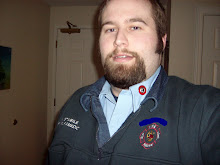Why?
Every book or collection of articles written by or about emergency service talks of how the world of firefighters, EMTs, and other first responders was irrevocably changed by 9/11. I became a firefighter in the summer after 9/11. I had no prior knowlege of what it was like before the towers fell.
To me, firefighter training always included the recognition of explosive devices. I was always told to be wary of fire hydrants, they could have been rigged with pipebombs set to kill me when I cracked the steamer port. Attending a training on a bio-hazardous terrorist attack is no different than a lecture on how to properly place a ladder, for me anyway.
I'm part of the so called "new generation" of firefighters, guys who got on the job after 9/11. To us, all of the weapons of mass destruction training is common place. Hearing the older guys complain about how they didn't have to learn this stuff before the planes, is like hearing them talk about how they used to wear leather jackets that ended just below the knee.
For me, firefighting and emergency service has always included response to terrorism.
The TV in my high school cafeteria showed me the second plane slamming into the towers. I watched them fall in health class. Upon returning home I learned that my cousin Stacey was on the 102nd floor of Tower Two.
While her remains were never recovered, I managed to piece together that she had made it to about the 85th floor, in the zone where the plane would have impacted. Hopefully her passing was a painless surprise.
Saying that 9/11 didn't effect me as a firefighter would be a lie. I am a firefighter because of 9/11. My cousin wasn't alone when she died, countless firefighters were with her, they didn't know her. To them she was just another investment banker, but they were there for a complete stranger.
As stated in another article, emergency service is about people. My job, plain and simple is to be there at the worst possible moment of your life. In being there, its my hope to make things a little bit easier. I want to be able to make the pain and the fear go away.
People look at firefighters and they feel safer knowing that they're there. I've seen the look in a patient or victim's eyes when I arrive on scene. They're still scared but theres a flash, a sort of a glint. They see the uniform, the helmet, hell even the red suspenders and they know someone is there to help them. I'm not trying to say we're saints (personally, I'm far from it) but we are there, doing everything we can to make things better.
September Eleventh was a day that no matter how many firefighters showed up, the pain and fear still just grew and grew. I like to think, however, that the fact that they were there, made those who perished that much more comfortable. Maybe comfortable isn't the right word, there probably isn't even a word for making death easier.
This is a real downer to write but new generation or not, firefighters have to talk about 9/11. It's such an intrinsic part of our culture, not American culture (and it is) but fire culture. Being in a job such as firefighting can make one complacent. Yeah its dangerous, but thats part of the fun. We start to see the danger as a challenge. Then theres 9/11, the ultimate danger, a lot of good people (from both public safety and civilians) were lost on that day. September Eleventh serves as a constant reminder as to why we do what we do.
We are not thrill seekers, although we do a lot of things for the thrill, we are people-people. If I can't save someone, I'll sit there and hold his hand, he won't die alone. As a firefighter, EMT, cop, whatever, its easy to loose sight of why you do your job. Sure, the people will see a uniform and a badge and go bullshit because you represent the authority they hate, but deep down, they are always glad that someone is coming when they call. A relative might not come when you dial their number. Your friend might ignore your email. Your spouse could write off your note. But when you dial 911 we will always show up. In your hour of pain you won't be alone. Total strangers are ready to race to your house, even if all we can do is hold your hand.

